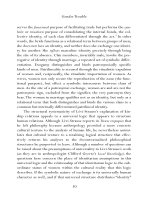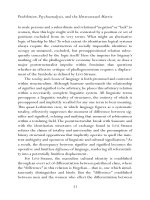GENDER TROUBLE 39
Bạn đang xem bản rút gọn của tài liệu. Xem và tải ngay bản đầy đủ của tài liệu tại đây (20.53 KB, 1 trang )
Gender Trouble
assumed to be true about the category of women. For feminist theory,
the development of a language that fully or adequately represents
women has seemed necessary to foster the political visibility of
women. This has seemed obviously important considering the pervasive cultural condition in which women’s lives were either misrepresented or not represented at all.
Recently, this prevailing conception of the relation between feminist theory and politics has come under challenge from within feminist
discourse.The very subject of women is no longer understood in stable
or abiding terms. There is a great deal of material that not only questions the viability of “the subject” as the ultimate candidate for representation or, indeed, liberation, but there is very little agreement after
all on what it is that constitutes, or ought to constitute, the category of
women.The domains of political and linguistic “representation” set out
in advance the criterion by which subjects themselves are formed,
with the result that representation is extended only to what can be
acknowledged as a subject. In other words, the qualifications for being
a subject must first be met before representation can be extended.
Foucault points out that juridical systems of power produce the subjects they subsequently come to represent.1 Juridical notions of power
appear to regulate political life in purely negative terms—that is,
through the limitation, prohibition, regulation, control, and even “protection” of individuals related to that political structure through the
contingent and retractable operation of choice. But the subjects regulated by such structures are, by virtue of being subjected to them,
formed, defined, and reproduced in accordance with the requirements
of those structures. If this analysis is right, then the juridical formation
of language and politics that represents women as “the subject” of feminism is itself a discursive formation and effect of a given version of
representational politics. And the feminist subject turns out to be discursively constituted by the very political system that is supposed to
facilitate its emancipation. This becomes politically problematic if that
system can be shown to produce gendered subjects along a differential
4









